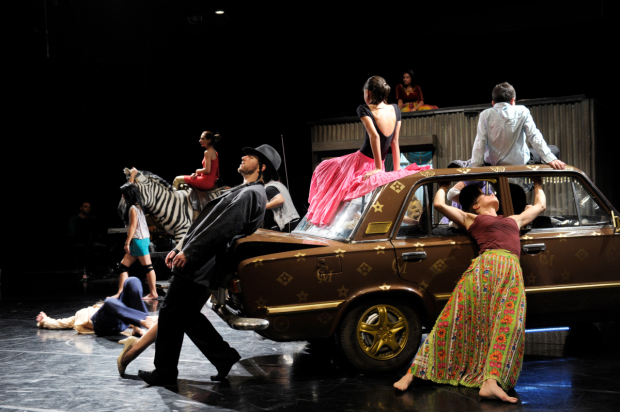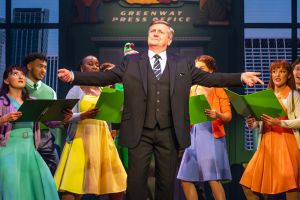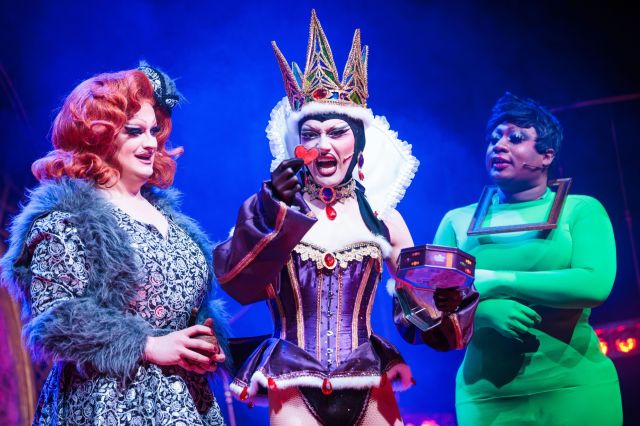Matt Trueman: Theatre is the antidote to poisonous politics
At the end of a dismal week Matt Trueman discovers several pieces at LIFT which show how these these divided times need the empathy theatre promotes

(© Thomas Aurin)
At the end of a dismal week, one in which Britain seemed to have riven itself in two, I found myself watching a group of Romany travellers dancing onstage at the Royal Court. In Open for Everything, 20-odd travellers burst out of a Louis Vuitton-branded estate car and kickstart a party. A band plays traditional Roma folk music and the rest of the company get down – bodypopping, skirt swishing, tubthumping, foot-stomping. In many ways it was a shambles, squished onto a too-small stage, but it was a shambles with real soul. More than that, it confirmed that theatre can be the antidote to poisonous politics.
The campaign for Brexit has become one fuelled by fear – in particular, fear of the other. It has sought to divide, drawing a line between us and them – natives and migrants, Brits and traitors. Last week’s infamous ‘Breaking Point’ poster, a direct echo of genuine Nazi propaganda, made all that overt: a queue of anonymous brown faces, subsumed into an amorphous crowd. You could call it a hoard, but hoards don’t usually form orderly queues. In the killing of Jo Cox, the aggressive tone of that campaign found physical form.
Theatre is an art-form that requires us to try and understand others
Romany travellers are routinely demonised. Their nomadic lifestyle makes them perennial outsiders, and many traveller communities incur discrimination as a result. They are pegged with stereotypes and myths, either through misunderstanding or malice – that they’re thieves, that they fight, that (as one scene played out) they torture children. But these are judgements imposed from the outside, conclusions reached at a distance, based on assumption and, yes, prejudice. Theatre can rectify that. It has a unique ability to bring us face to face with other people.
Watching Open for Everything, I found myself thinking back to the Channel 4 series My Big Fat Gypsy Wedding – a documentary that dropped into traveller communities. For all that it was an accurate portrayal – indeed, the High Court ruled as much – the series tended to focus on elements that were unique to that culture: flamboyant dresses, organised fights, ‘grabbing.’
Television tends to be reductive. The camera can distort; editors can cut as they please. Film something and you immediately objectify it. My Big Fat Gypsy Wedding was alleged to have caused "real, measurable and long-term harm" in the way travellers were seen and treated in this country.
Theatre is different. Theatre has a knack of admitting complexity. It holds contradictions. Put people onstage and there they are – in full, as they really are. There’s no escaping their good qualities and their bad, the way they hold themselves, the way the behave. It can’t divorce differences from commonalities. It makes us see ourselves in others and others in ourselves.
By the end, there was no us and them. Just a room full of people
In that, theatre is a meeting place – a site that forces us to try to understand one another. It can forge encounters that might not otherwise have happened – there’s not much of an overlap between Royal Court audiences and Romany travellers – but in the moment, we share a space, look into one another’s eyes. They hold our gaze. We give them our attention.
That’s key. Several polls have shown that those most likely to interact with immigrants hold the most positive perception of immigration. Those against it are more likely to be entrenched out of ignorance. Theatre has the tools to challenge that. It can undermine the absolute idea of the other.
As the band played and the violins repeated their riffs, a strange thing happened. The Royal Court audience – traditionally rather well-behaved and well-to-do – began to warm up. Heads were nodding along; feet, tapping. Somebody whooped a dancer on, then somebody else. By the end, that demure, discerning audience was clapping in time and trilling along – caught up in the joy of it all. By the end, there was no us and them. Just a room full of people.
This year’s LIFT has been full of real people and real stories – be it the Falklands veterans of Minefield, former enemies working together, the teenage girls in the Hamilton Complex, or the many lives recorded in Clare Patey’s A Mile In Your Shoes.
These divided times need theatre
A Mile In Your Shoes takes the old proverb and makes it real. You slip on someone else’s shoes and take them for a stroll. The owner’s voice plays out in your ear: a recording talking through their life and experiences. It’s an experience defined by their absence, and yet you feel a palpable connection to this person. It’s as if you’re a guest in their shoes – honour bound to listen carefully to their story. In really listening, you imagine. What it is to see land after 21 days on a refugee boat. What it a beer tastes like after 17 months in a detention centre. You place yourself in the story. You walk a walk that isn’t yours. Miss Africa’s sequinned six-inches wedges made me strut (or else risk a fall) and I felt the ground through the thin soles of a hospital imam’s leather slippers; metal shoelace tags grounding me with every step.
It’s part of Patey’s Empathy Museum project – and really, that’s what we talking about. Empathy. It’s been at the centre of LIFT this year, something artistic director Mark Ball spoke about in an interview recently: "There is a growing body of evidence that with our stream based, individualistic culture we are living increasingly atomized, slightly disconnected lives. We are spending time staring at our phones rather than looking at people's faces – that in itself is actually leading to a lack of empathy and neuroscientists are telling us that it's limiting our ability to be empathetic."
Theatre can counteract that – even without putting real people onstage. It is a human art-form that requires us, as an audience, to try and understand others. It is nothing less than an empathy machine – and that’s exactly what these divided times need.












